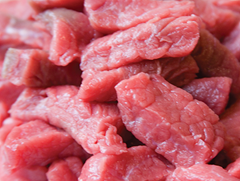Food and fraud: the meat scandal
 Misleading labelling has led to major investigation into the quality and safety of the supply chain.
Misleading labelling has led to major investigation into the quality and safety of the supply chain.
Food processors in Newry, Strabane and Monaghan have come into the media spotlight after investigators found that horse meat was being labelled as beef and pork as halaal food. Police and food safety agencies are searching for the cause of the problem in a supply chain which crosses 18 European countries.
The crisis represents a serious breach of trust between the industry and consumers with the risk of a threat to human health. The UK Food Standards Agency has also pointed out that the low cost of processed horse meat (a fifth of the cost of beef) acts as an incentive for fraud.
This has been the first major incident for Environment Secretary Owen Paterson since he moved from the Northern Ireland Office in September. Paterson has been criticised by Labour for a slow response to the crisis and providing limited information. His meeting with major retailers took place three weeks after first test results were released.
The Environment Secretary claimed that an “international criminal conspiracy” may be responsible but also encouraged members of the public to buy food as normal, as no health risk had yet been identified. Police investigations are at an early stage. Lab results will also provide more detail on the scale of the problem.
Shadow Environment Secretary Mary Creagh, whose family includes cattle farmers in Northern Ireland, corrected her initial claim that 70,000 horses were unaccounted for in the province. The figure instead refers to the whole island.
Creagh contends that the Government has wrongly focused on Poland and Romania, where no evidence of wrongdoing has yet been uncovered, when the problem appeared to originate in Ireland. She pointed out that phenylbutazone (which can cause anaemia in humans) was present in horse meat and could be passed into the food chain, if proper safeguards were not in place.
Under EU law, the UK can only halt meat imports if there is a clear risk to human health. The EU’s Agriculture and Fisheries Council, chaired by Irish Agriculture Minister Simon Coveney, is discussing how member states should respond. Health Commissioner Tonio Borg and Agriculture Commissioner Dacian Cioloş will be responsible for drafting new EU legislation.
Clearer country of origin labelling for fresh meat is one potential outcome. This is currently voluntary for some foods and compulsory for others, with the place of “last substantial change” considered as the country of origin.
Despite the damage caused by the BSE and foot and mouth crises, the UK Government ended weekly abattoir inspections in England in the early 2000s and later reduced the number of spot checks. The move was part of a drive for de-regulation and cutting back on ‘red tape’. Checks in Northern Ireland and the Republic of Ireland are, by comparison, more stringent and the Food Standards Authority of Ireland was the first to identify horse meat.
In her initial response, on 16 January, Agriculture Minister Michelle O’Neill said that she had “no reason to believe that this is other than an isolated instance” or that there were “issues with beef processing” in the Northern Ireland.
“We have an excellent beef processing industry, which meets the highest standards of hygiene, traceability and quality,” O’Neill added. “It is founded on the long tradition in the North of grass-fed beef from identified family owned farms. Our beef is second to none and consumers should have every confidence in the supply chain here.”





